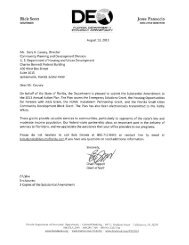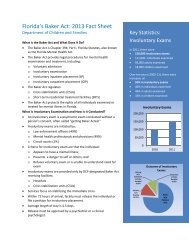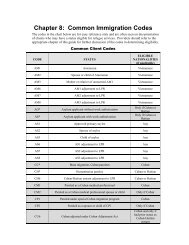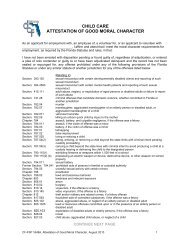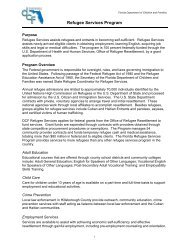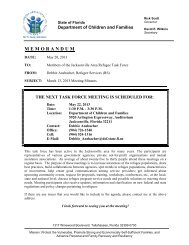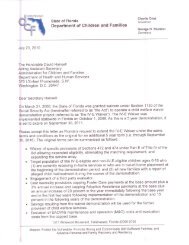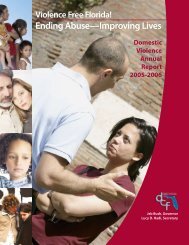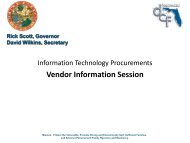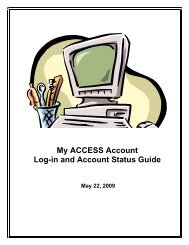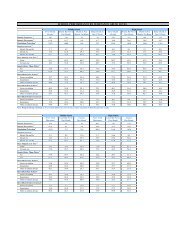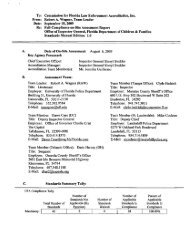The National Strategy for Child Exploitation Prevention and Interdiction
The National Strategy for Child Exploitation Prevention and Interdiction
The National Strategy for Child Exploitation Prevention and Interdiction
You also want an ePaper? Increase the reach of your titles
YUMPU automatically turns print PDFs into web optimized ePapers that Google loves.
local, <strong>and</strong> tribal law en<strong>for</strong>cement agencies in the U.S., more than 2,500 are members or affiliatesof one of the 61 Internet Crimes Against <strong>Child</strong>ren Task Forces. <strong>The</strong> ICAC Task Forces havedemonstrated a dramatic increase in the number of computer <strong>for</strong>ensic examinations they haveconducted. In 2007, they reported nearly 10,500 computer <strong>for</strong>ensic examinations. ICACcomputer <strong>for</strong>ensic capacity was increased in 2007 through targeted grants to 13 of the then-59ICAC Task Forces, totaling $2.6 million, <strong>for</strong> that purpose. <strong>The</strong>se grants, which exp<strong>and</strong>edcapacity at roughly one fourth of the ICAC Task Forces, had a direct impact – in 2008, ICACTask Forces reported 14,339 computer <strong>for</strong>ensic examinations in 2008 <strong>and</strong> 19,269 in 2009. Inshort, following the issuance of capacity-increasing grants, the ICAC Task Forces per<strong>for</strong>medabout twice as many <strong>for</strong>ensic examinations in 2009.2. FBI Computer Analysis Response Team <strong>and</strong> Regional Computer ForensicLaboratory Programs<strong>Child</strong> exploitation investigators, as well as other federal, state <strong>and</strong> local law en<strong>for</strong>cementagencies rely upon the FBI’s Computer Analysis Response Team (CART) <strong>and</strong> RegionalComputer Forensic Laboratory (RCFL) programs to provide digital <strong>for</strong>ensic search <strong>and</strong>examination support, in support of their investigations. Nominally, the Computer AnalysisResponse Team (CART) is an organizational component of the FBI’s Digital Evidence Section(DES) that began in 1988 under the FBI Laboratory Division as one of the earliest computer<strong>for</strong>ensic examiner groups in the country. Today, the term CART generically refers to threegroups: 1) the CART Forensic Analysis Unit (CART-FAU) that staffs <strong>and</strong> manages the FBI’sDigital Evidence Laboratory (DEL) which is fully accredited by American Society of CrimeLaboratory Director’s Laboratory Accreditation Board (ASCLD-LAB) <strong>and</strong> assists in settingwritten, tested, verified, vetted, defensible <strong>for</strong>ensic procedures <strong>and</strong> protocols <strong>for</strong> all CARTcertifiedpersonnel that are designed to meet <strong>and</strong> exceed the expert witness technical/scientificadmissibility requirements of Daubert v. Merrill Dow Pharmaceuticals, Inc., 509 U.S. 579(1993) <strong>and</strong> its progeny; 2) <strong>The</strong> CART Operational Support Unit (CART-OSU) which supports<strong>and</strong> equips but does not manage CART-certified digital evidence <strong>for</strong>ensic examiners but who areannually proficiency tested, monitored <strong>and</strong> periodically trained by the DES, <strong>and</strong>; 3) <strong>The</strong> CARTField Examiners, themselves, who are trained, certified, tested <strong>and</strong> monitored by CART-OSU<strong>and</strong> other DES units but are exclusively supervised <strong>and</strong> controlled by the management staff ofeach individual FBI Field Division in which they are located.In the FBI, there are approximately 225 CART-certified digital evidence <strong>for</strong>ensic examinersdispersed at nearly 98 FBI locations, approximately 45% of which are sworn FBI Agents whilethe remainder are professional support staff. An additional 200 or so state <strong>and</strong> local task <strong>for</strong>ceofficers <strong>and</strong> professional support from approximately 130 police agencies are also “CARTcertified”<strong>and</strong> are located at 16 Regional Computer Forensic Laboratories (RCFLs)geographically dispersed around the country.<strong>The</strong> RCFL Program is built on partnerships between the FBI <strong>and</strong> other law en<strong>for</strong>cement agenciesat the federal, state <strong>and</strong> local levels operating within a geographic area. An RCFL is a computer<strong>for</strong>ensics laboratory <strong>and</strong> training center devoted to the <strong>for</strong>ensic examination of digital evidencein support of criminal investigations. <strong>The</strong> RCFL Program currently manages a network of 14existing laboratories in major cities across the United States with two more labs due to open by131



